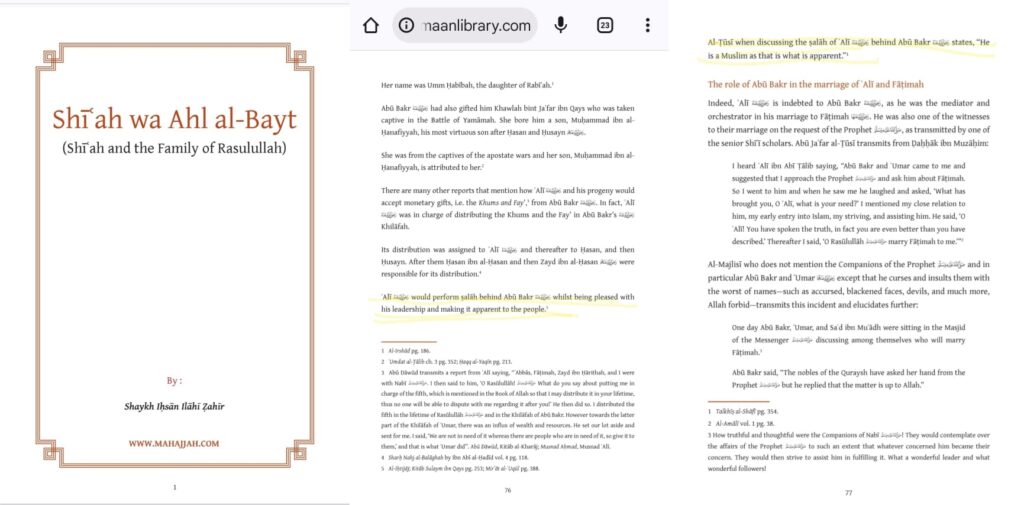Refutation Two
Zahīr’s false claim that that Shia Scholars affirm the Imam Ali (as) deemed the caliphate of Abu Bakr legitimate
Ẓahīr’s deception extends beyond textual manipulation to the outright misattribution of statements. One of the most striking examples is his claim that Shaykh al-Ṭūsī acknowledged that Amir al-Mu’minin prayed behind Abu Bakr out of genuine recognition of his leadership. Ẓahīr writes:
ʿAlī would perform ṣalāh behind Abū Bakr whilst being pleased with his leadership and making it apparent to the people.
Al-Iḥtijāj; Kitāb Sulaym ibn Qays pg. 253; Mir’āt al-ʿUqūl pg. 388.
Al-Ṭūsī when discussing the ṣalāh of ʿAlī I behind Abū Bakr I states, “He is a Muslim as that is what is apparent.”
Talkhīṣ al-Shāfī pg. 354.
(Shīʿah wa Ahl al-Bayt, pages 76-77)
https://ar.lib.eshia.ir/86657/14/36?utm_source=chatgpt.com

A careful reading of Shaykh al-Ṭūsī’s actual words reveals no such endorsement. The scholar merely notes the outward act ẓāhiran, not Imam Ali’s (as) inner conviction. In Shia jurisprudence, ẓāhiran indicates that an act is observable but does not imply approval. Ẓahīr erases this distinction, presenting a neutral legal observation as a theological endorsement.
To clarify the difference, consider the following example:
- A man is seen ẓāhiran eating with a group of people. Outwardly, he appears to be one of them.
- But unless he has the niyyah (intention) of joining their group, his outward action does not mean he truly identifies with them. He may only be there out of courtesy, compulsion, or circumstance
The same applies to prayer: Imam Ali (as) may have been present in prayer lines ẓāhiran, but without niyyah al-iqtidaʾ (the specific intention to follow the imam of prayer), the act cannot be taken as recognition of Abū Bakr’s legitimacy. Outward participation is not proof of inner endorsement.
The principle is foundational: in Islam, actions are judged by intentions.
حَدَّثَنَا الْحُمَيْدِيُّ عَبْدُ اللَّهِ بْنُ الزُّبَيْرِ ، قَالَ: حَدَّثَنَا سُفْيَانُ ، قَالَ: حَدَّثَنَا يَحْيَى بْنُ سَعِيدٍ الْأَنْصَارِيُّ ، قَالَ: أَخْبَرَنِي مُحَمَّدُ بْنُ إِبْرَاهِيمَ التَّيْمِيُّ ، أَنَّهُ سَمِعَ عَلْقَمَةَ بْنَ وَقَّاصٍ اللَّيْثِيَّ ، يَقُولُ: سَمِعْتُ عُمَرَ بْنَ الْخَطَّابِ رَضِيَ اللَّهُ عَنْهُ عَلَى الْمِنْبَرِ، قَالَ: سَمِعْتُ رَسُولَ اللَّهِ صَلَّى اللَّهُ عَلَيْهِ وَسَلَّمَ، يَقُولُ: ” إِنَّمَا الْأَعْمَالُ بِالنِّيَّاتِ، وَإِنَّمَا لِكُلِّ امْرِئٍ مَا نَوَى، فَمَنْ كَانَتْ هِجْرَتُهُ إِلَى دُنْيَا يُصِيبُهَا أَوْ إِلَى امْرَأَةٍ يَنْكِحُهَا، فَهِجْرَتُهُ إِلَى مَا هَاجَرَ إِلَيْهِ “
Narrated ‘Umar bin Al-Khattab:
I heard Allah’s Messenger (ﷺ) saying, “The reward of deeds depends upon the intentions and every person will get the reward according to what he has intended. So whoever emigrated for worldly benefits or for a woman to marry, his emigration was for what he emigrated for.”
Sahih al-Bukhari 1
Without explicit niyyah al-iqtidaʾ, the outward act of prayer does not signify acceptance or recognition. Ẓahīr’s claim ignores historical context, political pressures, and the absence of evidence confirming Imam Ali’s (as) intent.
Ẓahīr applies the same method elsewhere, notably with Sayyid al-Murtadha’s al-Shāfī fī al-Imāmah, Sheikh Kashif al-Ghita, and Sheikh Muhammad Jawad Mughniyah. He lifts quotes out of context, presents Muʿtazili objections as Shiʿa affirmations, and fabricates attributions to support his narrative. He erases clarifications, conceals polemical framing, and converts refutations into apparent confessions. This is not interpretation, it is intellectual fraud.
By systematically manipulating sources—removing qualifiers, misattributing statements, and erasing context, Ẓahīr constructs an artificial narrative designed to mislead readers. His work is not scholarship; it is propaganda. He preys on the inability of most readers to verify sources, presenting a caricature of Shiʿa scholarship while undermining intellectual integrity.
